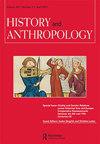斋月期间的坏事:伊斯兰人类学中的时代性、历史性和对同一性的拒绝
IF 0.4
2区 历史学
Q3 ANTHROPOLOGY
引用次数: 0
摘要
本文章由计算机程序翻译,如有差异,请以英文原文为准。
Being bad during Ramadan: Temporality, historicity and the refusal of coevalness in the anthropology of Islam
ABSTRACT Wary of the ‘denial of coevalness’ associated with earlier anthropology, anthropologists at the turn of the millennium increasingly emphasized how sharing not just space but also time is constitutive of the ethnographic encounter. However, drawing on online and offline fieldwork conducted in Jordan, I use the tensions between a blood feud and the holy month of Ramadan to illustrate how humans often refuse to inhabit each others’ histories and temporal schemes regardless of the presence of anthropologists. I argue that discomfort with acknowledging such refusals of coevalness has increasingly hobbled anthropological description, especially at a time when new communications technologies are re-shaping human experiences of sharing (and not sharing) space and time. I suggest that anthropologists would benefit from following many of the Jordanian Muslims I encountered in attending to how one does not ‘share time’ with various others – as well as the ways in which one does.
求助全文
通过发布文献求助,成功后即可免费获取论文全文。
去求助
来源期刊

History and Anthropology
Multiple-
CiteScore
1.80
自引率
0.00%
发文量
41
期刊介绍:
History and Anthropology continues to address the intersection of history and social sciences, focusing on the interchange between anthropologically-informed history, historically-informed anthropology and the history of ethnographic and anthropological representation. It is now widely perceived that the formerly dominant ahistorical perspectives within anthropology severely restricted interpretation and analysis. Much recent work has therefore been concerned with social change and colonial history and the traditional problems such as symbolism, have been rethought in historical terms. History and Anthropology publishes articles which develop these concerns, and is particularly interested in linking new substantive analyses with critical perspectives on anthropological discourse.
 求助内容:
求助内容: 应助结果提醒方式:
应助结果提醒方式:


